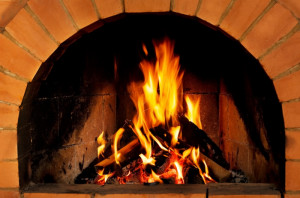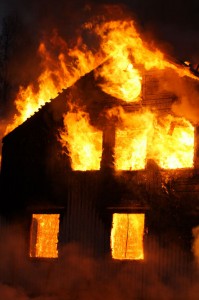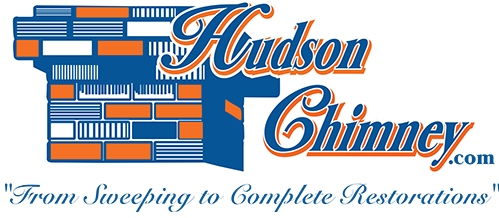by Mark Hudson | Jan 30, 2016 | Fire Safety Tips
Did you realize that half of the residential fires caused by home heating systems occur during the months of December, January, and February? Since we use our fireplaces, stoves, and other heating appliances frequently during these winter months, this statistic makes sense, but most of these home fires could have been easily prevented by following fire safety precautions. At Hudson Chimney, fire safety is our top priority, and we like to educate our customers on the best ways of operating their fireplaces and other heating appliances. We would like to tell you a few important fireplace safety tips that will keep you and your family warm and safe this winter.
Remember to have your fireplace and chimney professionally cleaned and inspected every year.

The most important preventive maintenance task you can do to avoid fire hazards is to schedule an annual appointment with Hudson Chimney for our chimney sweeping and inspection services. Our Chimney Safety Institute of America (CSIA)-certified chimney sweeps will reduce your risk of chimney fires by removing all of the creosote deposits that have accumulated on the inner walls of your chimney. We will also inspect your chimney to be sure there are no flue blockages or any damage that could cause your chimney to be unsafe to use.
You should always have your heating appliances professionally installed.
The
National Fire Protection Association (NFPA) recommends that all fireplace inserts, stoves, and other heating appliances be installed by certified professionals to protect you from hazards such as accidental fires and carbon monoxide leaks.
Keep the area surrounding your fireplace clear from combustible items.
To prevent an accidental fire being ignited by hot sparks and embers that can jump from the firebox, Hudson Chimney recommends that you keep all flammable items such as furniture, curtains, and rugs at least three feet away from your fireplace.
Set up a sturdy fireplace screen in front of your fireplace.
A metal mesh fireplace screen can prevent accidental fires by keeping hot sparks and embers from flying into the room. This will also protect your children and pets from getting too close to the fire.
Ensure you have smoke and carbon monoxide detector alarms installed in your room.
If you do not already, install these essential alarms in the same room as your heating appliance, outside each bedroom, and on every level of your home. Check the batteries for these alarms when you change your clocks in the spring and fall for Daylight Savings Time.
Need more fireplace safety tips? Contact us at Hudson Chimney to have your safety questions answered.
by Mark Hudson | Mar 10, 2015 | Fire Safety Tips
You may or may not have a fireplace in your home, but even if you do not have a fireplace, there is always a possibility of a house fire. If a fire does break out in your home, you may only have as little as two minutes to be able to escape. The best way to protect yourself and your family is the identification and removal of all fire hazards from your home. Another excellent way to protect yourself, your family, and your home is to know and follow important home fire safety tips. At Hudson Chimney, we like to educate our customers on fire safety, and we would like to share with you some fire safety tips we feel are essential.

Install Multiple Smoke Alarms Throughout Your Home.
The Red Cross states that 60% of house fire deaths occur in homes with no smoke alarms installed. Smoke alarms should be installed on every level of your home, inside bedrooms, and outside sleeping areas. Make it a monthly routine to check your smoke alarms to be sure they are still working properly. Smoke alarms will usually last for at least 10 years; however, you will have to change the batteries to keep them working properly.
Create an Escape Plan to Have in Place for Your Entire Family.
Everyone in your home should know two ways to escape from every room in your home. Designate a meeting place outside the house to be sure everyone has gotten out safely. Use a two-minute time frame when you are planning your escape routes. Practice your escape plan with your family on a regular basis to be sure everyone knows how to proceed if an emergency should occur. Include waking up to smoke alarms, low crawling, and meeting outside during your escape plan practices. Be sure everyone in the house knows how to dial 911. Teach family members how to stop, drop, and roll if their clothes happen to catch on fire.
Be Safe in the Kitchen.
Never leave the kitchen unattended when cooking, frying, or broiling food, and do not leave your home when roasting, boiling, baking or simmering food. Set a timer to alert you when your food should be done cooking, baking, boiling, or roasting. Keep all flammable items like pot holders, towels, clothing, and plastic away from the stove. Keep all pets off cooking surfaces and countertops to prevent them knocking things onto the burners and to protect them from possibly burning themselves.
Use Common Sense.
Keep flammable items at least three feet away from space heaters, fireplaces, and other heating appliances. Turn off portable heaters when you leave the room and when you go to sleep. Never smoke in bed. Talk to your children on a regular basis about the dangers of fire. Always keep matches and lighters out of reach from children.
Know the Dangers of Carbon Monoxide.
Just as you do with smoke alarms, install carbon monoxide detector alarms on every level of your home, inside bedrooms, and outside sleeping areas. If one of these alarms goes off to alert you of the presence of carbon monoxide in your home, move quickly to the fresh air outdoors or stand by an open window or door. Never use generators, grills, camp stoves, or any other gasoline, propane, natural gas, or charcoal burning devices inside a home, a garage, basement, crawlspace, or other partially enclosed space.
Want to know more home fire safety tips? Contact our staff at Hudson Chimney. Fire safety education is part of our duties as CSIA-certified chimney sweeps, and we take pride in teaching our customers about fire safety procedures and precautions.


